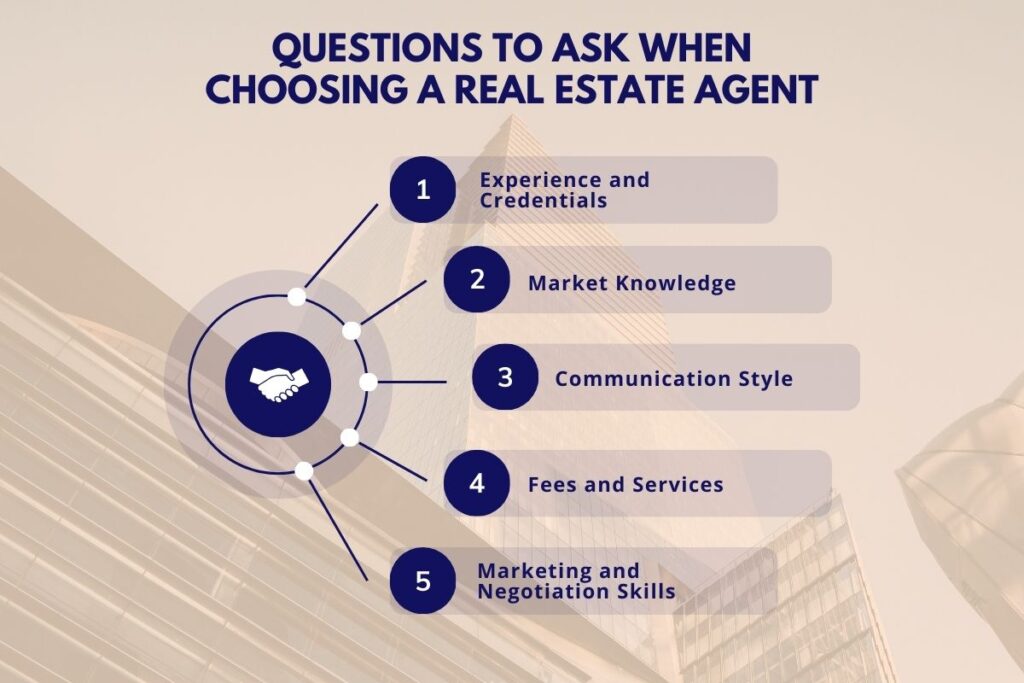When you’re buying or selling a home, selecting the right real estate agent is one of the most critical decisions you’ll make. Why? Because the right agent can make or break your real estate experience. An experienced, knowledgeable agent can save you time, money, and stress—while a poor fit might leave you frustrated and unsatisfied with the results.
Let’s dive into the most important questions to ask when choosing a real estate agent so you can find someone who meets your needs and delivers results.
Why Choosing the Right Agent Matters
The National Association of Realtors (NAR) represents over 1.5 million real estate professionals in the U.S. Their research shows that experienced agents not only help sellers secure higher offers but also assist buyers in negotiating better deals. Similarly, Zillow Research highlights that agents with local market knowledge often close deals faster.
Bottom line? The stakes are high. Whether you’re buying your first home or selling your current property, your choice of agent significantly impacts the process and outcome.
Questions to Ask When Choosing a Real Estate Agent
Here are the questions that can help you find proper agents to buy or sell your house.

1. Experience and Credentials
Your first step is to assess the agent’s experience. Real estate transactions are complex, and an agent’s expertise can mean the difference between a smooth process and a nightmare.
Here are some key questions to ask:
- How long have you been a licensed real estate agent?
- How many transactions do you handle annually?
- Are you a member of the National Association of Realtors (NAR)?
Why this matters: According to NAR, agents who follow their guidelines and ethical standards are better equipped to represent your interests. An agent with a proven track record gives you confidence in their ability to navigate potential roadblocks.
Red Flag: Avoid agents who dodge questions about their credentials or experience.
2. Market Knowledge
Local expertise is invaluable. An agent who knows the market inside and out can identify the best opportunities and provide insights that a less experienced agent might need to look into.
Ask these questions:
- What neighborhoods do you specialize in?
- How familiar are you with current housing market trends?
- Can you provide recent examples of properties you’ve bought or sold in this area?
Zillow Research emphasizes that experienced agents with market knowledge help sellers secure higher offers and buyers find homes that meet their needs. This is where interviewing a real estate agent becomes crucial to ensure their knowledge aligns with your goals.
3. Communication Style
Real estate transactions often involve multiple stakeholders, tight timelines, and unexpected developments. Clear communication is critical.
Ask these questions to gauge their communication style:
- How often will we check in?
- What’s your preferred method of communication (calls, emails, texts)?
- Who will be my main point of contact during the process?
Pro Tip: The Consumer Financial Protection Bureau (CFPB) advises homebuyers and sellers to choose agents who provide timely updates and make complex processes more accessible to understand.
Red Flag: Agents who are slow to respond or vague about their availability may not provide the attention your transaction requires.
4. Fees and Services
Understanding the financial side of working with an agent is essential.
Key questions include:
- What are your commission rates?
- Are there additional fees I should be aware of?
- What services are included in your commission?
The Balance recommends interviewing multiple agents to compare their fees and services. Look for transparency and clarity.
Pro Tip: Higher commission rates don’t always guarantee better service, but an agent who’s too eager to discount their rates might not be as invested in your transaction.
5. Marketing and Negotiation Skills
For sellers, an agent’s ability to market your property effectively can attract the right buyers and maximize your sale price. For buyers, negotiation skills are critical to securing the best deal.
Ask these questions:
- How will you market my property (if selling)?
- Can you share examples of past marketing strategies?
- How do you approach negotiation on behalf of your clients?
Why this matters: According to the Balance, a skilled negotiator can make a significant difference in the financial outcome of a transaction.
How to Evaluate Answers
Hearing the right answers is one thing—knowing how to evaluate them is another. Here’s what to consider:
- Consistency: Do the agent’s responses align with what others have said about them (e.g., reviews or references)?
- Confidence: Do they speak with confidence about their strategies and experience?
- Transparency: Are they forthcoming with details about their services and processes?
Red Flag: Avoid agents who are defensive, vague, or dismissive of your concerns.
Comparing Agents
After you’ve interviewed a few agents, it’s time to compare. Here are some tips:
- Create a Checklist: Note each agent’s strengths, weaknesses, and standout qualities.
- Check References: Speak to previous clients about their experiences.
- Trust Your Instincts: If something feels off, don’t ignore it.
The Balance advises prioritizing agents who demonstrate a strong commitment to your goals and make you feel confident in your abilities.
Conclusion
Choosing the right real estate agent isn’t just about asking the right questions—it’s about listening to their answers and assessing how they align with your needs. By interviewing multiple agents and evaluating their experience, market knowledge, communication style, and fees, you’ll be better equipped to make an informed decision.
Remember, this isn’t just a business transaction; it’s a partnership. Take the time to find someone who truly understands your goals and has the skills to achieve them.
